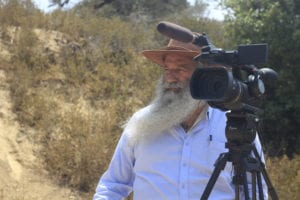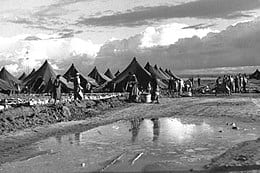Aliyah and Making a Living
When I am not writing, or translating books, or teaching, I make movies. Recently, I received a letter from a reader who is contemplating Aliyah:
“I am a professional film producer based in NY who is exploring the option of aliyah. My only reservation in moving to Israel is the lack of a job. How can someone like myself who was very successful in the business (and never compromised his Yiddishkeit) make a living in Israel? I am not looking to make millions, just a living wage to support a family of six. Do you have any suggestions?
Answer:
The issue of aliyah and making a living is a legitimate concern. The Zohar says that our forefather, Avraham, searched for the place in the world where he could get as close as possible to Hashem. This burning desire of Avraham was the catalyst that brought Hashem to command him, “Get thee forth to the Land that I will show you.” Rashi explains that the double language, “Lech lecha,” was to reassure Avraham that the move was for his ultimate good and that it would bring him and his descendents great spiritual and material blessing. After all, it is no small challenge and test of faith to give up your country of birth, social standing, and livelihood to move to another land. And indeed, at first, things did not go easily for Avraham. There was a famine in the land! But, eventually, Avraham became a very rich man. In the Gemara, Rebbe Shimon Bar Yochai teaches that a person has to experience sufferings to attain three precious things: acquiring Torah knowledge, attaining the World to Come, and living in the Land of Israel, (Berachot 5A).
This uncertainty, challenge, and difficulty is common to all olim. The word “canaan” as in the land of Canaan, also has the meaning of humbleness and poverty. The lowering of one’s status is part of the immigration process, helping to break impure traits of pride and ego which prevent a person from getting closer to Hashem. Aliyah means to go up, and therefore, the first and foremost goal of each new immigrant to Israel should be spiritual – to get closer to Hashem. When a person holds fast to this goal, clinging to it at all times, even through periods of difficulty and change, the Almighty’s blessings flow in its wake.
In practical terms, when you first make aliyah, you indeed may not be able to make a living as a film producer. You may have to get to know the right people first, learn the language, etc. You may have to make videos of bar mitzvahs and weddings to have some income coming in before you make the bigger, professional films that you are accustomed to making. And it may turn out that you won’t be able to find a niche in the film business here, and you may have to change your profession. But always remember, “Is G-d’s hand too short that He cannot provide for you and your family?” Just as He provided for us in the Wilderness, He provides for us still today, each person according to what is best for his needs. Does a shepherd not provide for his sheep? Remember, “The L-rd is my shepherd, I shall not be in want.” These reassuring words of King David should be your mantra during your passage and time of transition.
In addition, over the last two decades, Israel’s economic growth has constantly risen. Compared to other countries, Israel has one of the strongest economies in the world. Israel has become a world leader in hi-tech and successful start-ups. While many people have to struggle to cover monthly expenses, unemployment is low. Compared to times when new olim had to live in tents and drain swamps infested with malaria, today there are communities all over the country with comfortable housing, air-conditioning in every room, swimming pools, and olim from a variety of countries who can offer advice and guidance to new olim like you. The country was rebuilt by olim. They made it and so can you and you family. And for sure, your children will thrive here, empowered by the spirit of idealism which marks a person who gives up his life in the Diaspora in order take a part in the rebuilding of the Jewish Nation in the Jewish Homeland, a commandment which our Sages teach is equal in weight to all of the commandments of the Torah, (Sifre, Reah, 28).
ABOUT THE AUTHOR
Before making Aliyah in 1984, Tzvi Fishman taught Creative Writing at the NYU School of the Arts. In Israel, he studied Torah at Yeshivas Machon Meir, Beit-El, Ateret Cohanim, amd Mercaz HaRav. He has published nearly twenty novels and books on a wide range of Jewish themes, available at Amazon Books and the tzvifishmanbooks.com website, including Free Downloads. He is the recipient of the Israel Ministry of Education Award for Creativity and Jewish Culture. Recently, he produced and directed the feature film, “Stories of Rebbe Nachman” starring Israel’s popular actor, Yehuda Barkan. Presently, he is working on Volume Four of the “Tevye in the Promised Land” Series.
To see more of Rabbi Fishman’s blogs, Click on tzvi fishman at the top of the page.


